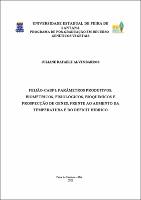| Compartilhamento |


|
Use este identificador para citar ou linkar para este item:
http://tede2.uefs.br:8080/handle/tede/1400| Tipo do documento: | Tese |
| Título: | Feijão-caupi: parâmetros produtivos, biométricos, fisiológicos, bioquímicos e prospecção de genes, frente ao aumento da temperatura e do deficit hídrico |
| Autor: | Barros, Juliane Rafaele Alves Barros  |
| Primeiro orientador: | Melo, Natoniel Franklin de |
| Primeiro coorientador: | Angelotti, Francislene |
| Resumo: | A seleção de cultivares de feijão-caupi (Vigna unguiculata L.) tolerantes torna-se de grande importância para garantir uma maior produtividade, frente as mudanças climáticas. Com isso, objetivou-se avaliar como o aumento da temperatura e o deficit hídrico afetam os parâmetros biométricos, produtivos, fisiológicos, bioquímicos e moleculares de diferentes cultivares de feijão-caupi. Os experimentos foram realizados em câmara de germinação, câmaras de crescimento e casa de vegetação, utilizando diferentes cultivares de feijão-caupi, as quais foram submetidas ao aumento de temperatura e diferentes disponibilidades hídricas. As cultivares respondem de forma distinta a esses estresses, com alterações fisiológicas, bioquímicas, moleculares e variação quanto a produção final. A porcentagem de germinação de sementes de feijão-caupi atinge valores acima de 90%, na faixa de 20-40°C. Entretanto, na temperatura de 40 °C não ocorre a formação de plântulas normais. As cultivares diferem entre si frente ao aumento de temperatura. Por meio da combinação das respostas biométricas, fisiológicas e produtivas a cultivar Itaim apresentou maior tolerância ao aumento de 4,8 °C na temperatura do ar. A fase da floração foi a mais sensível ao aumento de temperatura e ao deficit hídrico, com redução significativa na produção. A temperatura é o elemento climático determinante para a escolha da época de plantio, pois mesmo com disponibilidade hídrica de 100%, o aumento da temperatura reduz a produção. Genes P5CR e TPS6, pertencentes a diferentes classes de osmoprotetores, foram induzidos no feijão-caupi, cv. Carijó em resposta ao aumento da temperatura e a seca severa. |
| Abstract: | The selection of tolerant cowpea (Vigna unguiculata L.) cultivars is of great importance to ensure greater productivity in the face of climate change. Thus, the objective was to evaluate how the increase in temperature and water deficit affect the biometric, productive, physiological, biochemical, and molecular parameters of different cowpea cultivars. The experiments were carried out in a germination chamber, growth chambers and greenhouse, using different cowpea cultivars, which were subjected to increased temperatures and different water availability. The cultivars respond differently to these stresses, with physiological, biochemical, molecular changes and variation in the final production. The percentage of germination of cowpea seeds reaches values above 90%, in the range of 20-40 ° C. However, at a temperature of 40 ° C, normal seedlings do not occur. The cultivars differ from each other in view of the increase in temperature. Through the combination of biometric, physiological, and productive responses to cultivate Itaim showed greater tolerance to the increase of 4.8 ° C in air temperature. The flowering phase was the most sensitive to temperature increase and water deficit, with a significant reduction in production. Temperature is the determining climatic element for choosing the planting season, because even with 100% water availability, the increase in temperature reduces production. P5CR and TPS6 genes, belonging to different classes of osmoprotectors, were induced in cowpea, cv. Carijó in response to rising temperatures and severe drought |
| Palavras-chave: | Enzimas antioxidantes EROs Estresse abiótico Expressão gênica Trocas gasosas Vigna unguiculata L. Antioxidant enzymes ROS Abiotic stress Gene expression Gas exchange Vigna unguiculata L. |
| Área(s) do CNPq: | CIENCIAS AGRARIAS AGRONOMIA::CIENCIA DO SOLO CIENCIAS AGRARIAS::AGRONOMIA CIENCIAS BIOLOGICAS |
| Idioma: | por |
| País: | Brasil |
| Instituição: | Universidade Estadual de Feira de Santana |
| Sigla da instituição: | UEFS |
| Departamento: | DEPARTAMENTO DE CIÊNCIAS BIOLÓGICAS |
| Programa: | Doutorado Acadêmico em Recursos Genéticos Vegetais |
| Citação: | Barros, Juliane Rafaele Alves. Feijão-caupi: parâmetros produtivos, biométricos, fisiológicos, bioquímicos e prospecção de genes, frente ao aumento da temperatura e do deficit hídrico. 2021. 200 f. Tese (Doutorado Acadêmico em Recursos Genéticos Vegetais) - Departamento de Ciências Biológicas, Universidade Estadual de Feira de Santana, Feira de Santana, 2021. |
| Tipo de acesso: | Acesso Aberto |
| URI: | http://tede2.uefs.br:8080/handle/tede/1400 |
| Data de defesa: | 26-Mar-2021 |
| Aparece nas coleções: | Coleção UEFS |
Arquivos associados a este item:
| Arquivo | Descrição | Tamanho | Formato | |
|---|---|---|---|---|
| TESE_JULIANE RAFAELE ALVES BARROS 2021.pdf | Tese - Juliane Rafaele Alves Barros 2021 | 4,47 MB | Adobe PDF |  Baixar/Abrir Pré-Visualizar |
Os itens no repositório estão protegidos por copyright, com todos os direitos reservados, salvo quando é indicado o contrário.




